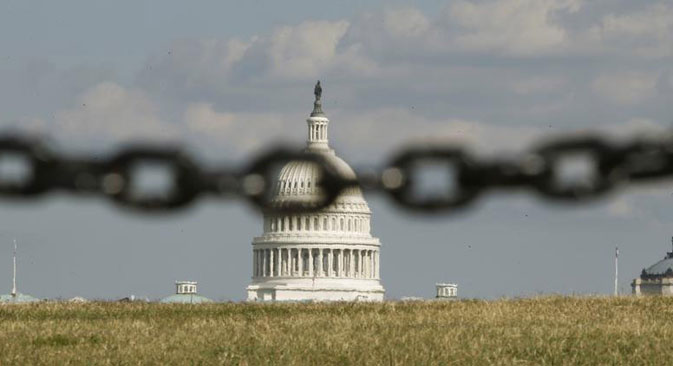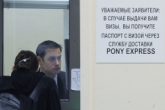What the U.S. government shutdown means for Russia

It remains to be seen what implications the U.S. government shutdown will have. Source: Reuters
As most Muscovites were heading to work, the U.S. government shutdown over disagreements ranging from fiscal policy, the federal budget and the healthcare law known as Obamacare. The issues are all domestic ones, but the move may affect the way the United States is viewed abroad.
This shutdown is the first in the 21st century. The U.S. government closed 15 times between 1977 and 1996, lasting anywhere from three days to three weeks. The most recent shutdown, which took place between mid-December 1995 and early January 1996 lasted 21 days.
According to the Washington Post, the current shutdown is expected to be longer than the 1995-1996 one, partially because it is taking place at the end of the fiscal year.
“Back then, several appropriations bills had been signed into law, including the two that funded the military, so most of the government stayed open,” according to the Washington Post, “But this time, no appropriations bills have been signed into law. That means the entire government would have no money to operate at midnight on Sept. 30.”
While the shutdown was on the minds of hundreds of thousands of U.S. federal workers, the move did not go unnoticed by those Russians who were hoping to get U.S. visas and those Americans needing help from American Citizen Services for anything from registering the birth of a child to replacing a lost passport.
When asked about the implications of the shutdown for U.S. Embassy services in other countries like Russia, a spokesperson at the U.S. Embassy in Moscow said: “The Department and USAID receive funding in the annual State, Foreign Operations, and Related Programs Appropriations Act. Under this law, appropriated money can remain available for expenditure for varying time periods, depending on the specific appropriation account.”
“Some money is only available for one year, while other appropriations accounts are multi-year, fee-based, or available until expended,” the spokesperson added. “In addition, because FY 2013 appropriations were not received until late March, certain State Department and USAID accounts have residual funds that will be available after Sept. 30, 2013.”
In layman’s terms, many of the Embassy services will still be available during the shutdown.
Related:
Russians in America: Chasing a dream or unemployment?
Visa applicants bury iPads in flowerbeds to meet U.S. Embassy security conditions
Nevertheless, it remains to be seen what long-term implications the shutdown will have for U.S. foreign policy and, particularly, for its image abroad.
Gregory Feifer, a writer and former Moscow correspondent for National Public Radio (NPR), sees the shutdown as “a stark example of reckless Republican zealotry” that will expose “dysfunctional American government.”
“This is a matter of domestic politics,” Feifer said. “I don't believe the U.S. government shutdown will affect President Obama's foreign policy vector in any significant way. That doesn't mean a shutdown won't affect American actions abroad, however, especially if it drags on.”
According to Feifer, a shutdown may require the government to suspend spending in many areas, including on foreign aid and delay military paychecks. Moreover, tackling “the crippling effects of a shutdown would distract the White House from its typical daily business,” which could include its ability to focus on foreign policy.
“But although trips abroad may be delayed or canceled, a shutdown shouldn't affect the long-term agenda in any way that would be palpable to Russia,” Feifer said.
Fyodor Lukyanov, editor-in-chief of the magazine Russia in Global Affairs, argues that U.S. domestic problems like the government shutdown might impact U.S. foreign policy indirectly.
“The more controversies the U.S. faces, the more likely people focus on their own domestic problems instead of supporting interference [in other countries],” he said, implying that the U.S. government could shift funding from risky foreign policy projects to more relevant domestic problems.
Lukyanov believes that the shutdown doesn’t have very serious implications for the rest of the world. But Lukyanov is concerned about the impending standoff over the raising of the U.S. debt ceiling, which must happen by mid-October or the country will default on its debt.
Both the shutdown and the debt ceiling fight send a negative message abroad, according to Lukyanov.
“The U.S. political elites
absolutely don’t seem to care about the rest of the world,” he said. “It might
not be important for ordinary Americans, but it creates a very unfavorable
image of the country in the world.”
Former C.I.A. analyst Paul Goble agrees. In a column for Russia Direct, Goble
wrote: “It [the shutdown] will suggest to other countries that the U.S. is now
so preoccupied with its own problems that there is an opening for them, thus
making an already dangerous world more dangerous still.
“In particular, the United States may very well be more willing to defer to major regional powers such as Russia in their relations with their neighbors and less willing to take a more active role in resolving conflicts with Iran and Syria.”
Read more comments from experts in the full version of the article at Russia Direct.
All rights reserved by Rossiyskaya Gazeta.
Subscribe
to our newsletter!
Get the week's best stories straight to your inbox

